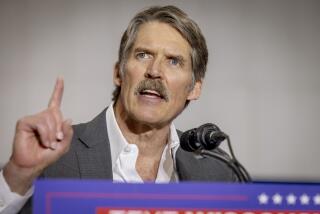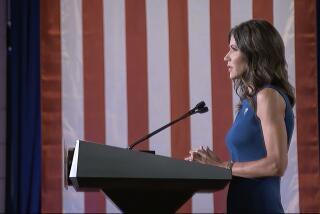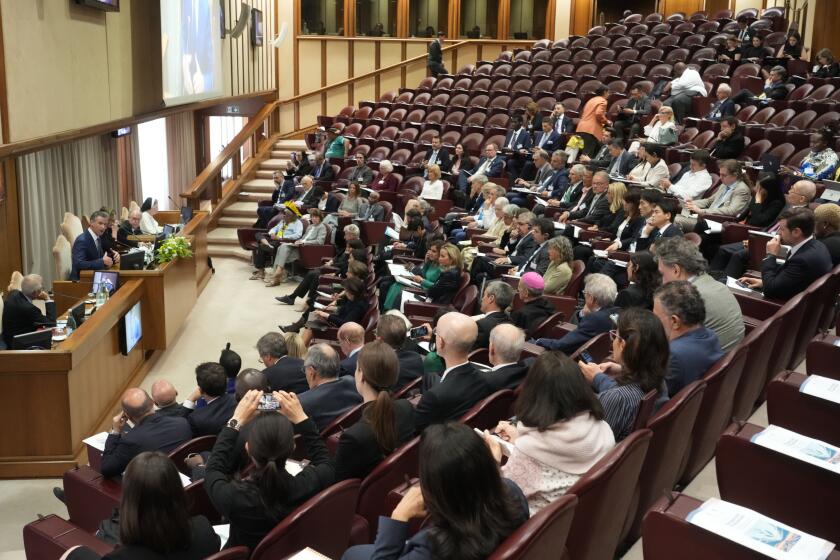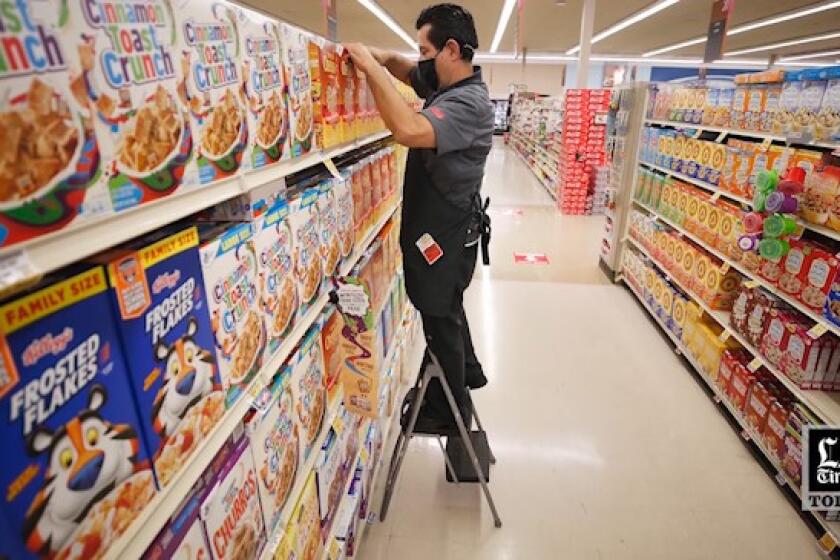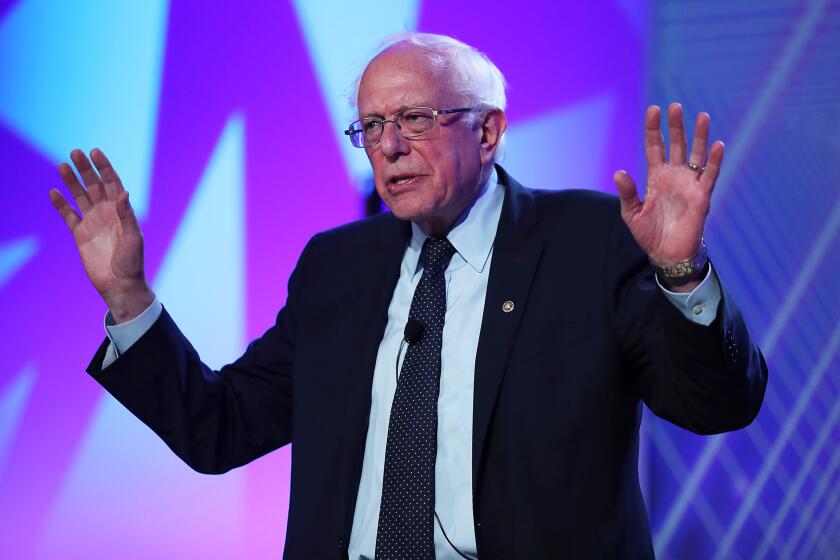GOP Senate Hopefuls Go for Big Finale
So now, the final 10 days are at hand in California’s Republican U.S. Senate race.
Bobbi Fiedler is mailing off flyers attacking Ed Zschau.
Mike Antonovich is broadcasting television attacks against Bruce Herschensohn.
Ed Zschau is stirring up Northern California memories about water wars; Bruce Herschensohn is riveted on the threat of world war.
And Bob Naylor and Ed Davis are among those riding in a mule parade in Bishop, Calif.
Add pie contests, a strawberry festival and Harbor Day celebrations, and you have participatory democracy at work.
Partisan control of the U.S. Senate may hang in the balance.
$8 Million Spent
After spending about $8 million, much of it on television commercials, and stalking voters for more than a year, there remains time for one more push, another twist in a Republican primary election race that has been uncommonly wide open from the day it started.
A Los Angeles Times Poll showed that as many as two in five Republicans were still undecided as of last week.
The competition to reach these swing voters is keen.
“This weekend is going to be slaughter city,” said a nervous Ron Smith, campaign manager for candidate Zschau, the Los Altos congressman who has become one of the front runners and therefore one of the prime targets of opposition attack.
One political career is about to be made on Election Day for whoever wins the right to challenge three- term Democratic Sen. Alan Cranston. The California seat is one of those that may decide if the Republicans continue to run the Senate for the last two years of Ronald Reagan’s presidency.
If history is a guide, the participation of the losing GOP candidates will be forgotten faster than breakfast.
Although public opinion samplings show two or three candidates inching ahead of the others, no fewer than seven contenders believe they have made a showing of themselves. Most hold out some hope, however thin, for victory.
‘Interesting Chess Game’
“Anything can and may happen. I think we’ll all be up very late the night of June 3 and the morning of June 4,” guessed Paul Clarke, campaign manager for Northridge Congresswoman Fiedler.
“We’re down to an interesting chess game--who is going to do what in what media market,” said Sal Russo, who is managing the candidacy of Los Angeles County Supervisor Mike Antonovich. “Whoever makes the right moves wins.”
For the time being, most of the moves point to the north, and south.
Conventional thinking, supported by polls, has it that Los Angeles County’s Republicans have made up their minds in greater numbers than GOP voters in other areas of the state, the result of familiarity with several candidates who have been news makers around the Southland for years.
That means more attention to San Diego County, Sacramento and the San Francisco Bay Area.
In the north, particularly, the latest Los Angeles Times Poll shows, there is a large undecided vote.
Zschau, who believes his natural base is the north, canceled 25% of his final round of television advertising in Los Angeles and moved the $65,000 or so upstate, according to campaign manager Smith.
Zschau is also starting to tailor his message to regional audiences on a tricky environmental issue: water.
If you are in San Francisco or Sacramento, you will see Zschau on television trumpeting his longtime opposition to the Peripheral Canal, the controversial project--rejected by voters in 1982--to move more water via aqueduct from northern rivers to the arid south.
Not for Southland
You will not hear that message in Southern California, where support for the canal was stronger. In Southern California, new Zschau ads will concentrate on his opposition to offshore oil drilling--a move geared to please Republicans in the beach communities.
That commercial was pulled for the weekend and replaced by previous spots touting Zschau as strong on defense and conservative on government spending, according to Smith, who said the strategy is to lie low while conservatives Antonovich and Herschensohn battle it out.
Yet another commercial is being prepared by the well-heeled Zschau operation for possible use later in the week. It mentions some of Zschau’s blue-ribbon endorsements to make a case that the congressman is the best candidate to beat Cranston.
In total, Zschau is saying that he will have spent $1.7 million on television from start to finish, with $325,000 allotted for the final two weeks.
But tailoring his message on such a divisive issue as water could lead to new criticism by opponents, who already have faulted Zschau’s decision to appear on a slate mailer that urges voters to reject Proposition 51, the “deep pockets” initiative.
Zschau actually supports 51, but his manager conceded that the campaign could not resist the opportunity to appear at low cost on a mailer that is headed for 2 million specially targeted Republicans.
Russo of the Antonovich campaign charged that Zschau’s embrace of the mailer was evidence that the former high-tech businessman was looking at politics as he once looked at the balance sheet.
“He’s looking at ‘how I get elected’ the same as he looked at ‘how I get profits,’ ” Russo said.
Mailer Criticized
Herschensohn said the mailer issue was another example of Zschau trying to be on both sides of an issue--a charge that started with his inconsistent votes on the MX missile and military aid to Nicaragua rebels, among other things.
“Once again, the voter must ask Ed Zschau where he stands on the issues,” Herschensohn said.
As a fellow front-runner--along with Zschau, according to the Times Poll--Herschensohn also is being attacked.
Antonovich, contesting Herschensohn for the most conservative GOP votes, unveiled a TV commercial that ridicules Herschensohn’s novel plan to balance the budget by having Congress set a “floating flat tax” sufficient to cover each year’s spending. Antonovich said this would mean an immediate $200-billion national tax increase.
The hastily prepared frontal assault was necessary because Herschensohn had cut significantly into Antonovich’s base of voter support in Los Angeles, Russo acknowledged. “Rather than try to lure them back slowly, we chose to shake them off of Herschensohn in a hurry, and they will tend to fall back to Mike.”
This followed the mailing of what the Antonovich campaign said were 100,000 mailers accusing Zschau of being too squishy-liberal for the GOP.
To bolster his own conservative credentials, Antonovich gratefully accepted the recent endorsement of television minister Pat Robertson. The religious spirit spread further in the Antonovich campaign this week when five different clergymen, one after the other, were called upon to bless his fund-raising dinner, a record number for the campaign.
Preservation Issue
For his part, Herschensohn acknowledged that his campaign prepared a television commercial attacking Zschau. But he pledged Saturday that it will not be used. Instead, he said he will stick with his foreign policy emphasis and his simple message: “The bottom line for me is the preservation of the United States.”
So far, Herschensohn’s television ads show him seated against a blue background, his signature scribbled over his shoulder--both trademarks of his eight years as commentator for KABC-TV in Los Angeles. His delivery is likewise the same: “Let’s forget the silly immigration ideas and instead give the Border Patrol enough to patrol the border.”
Fiedler is joining other candidates in concentrating her television advertising outside Los Angeles. “Not only are there more undecided voters, you get more bang for your (television) buck there,” said Fiedler aide Clarke.
Her main weapon remains the visual image of her standing alongside President Reagan at a 1984 San Fernando Valley rally with their arms joined aloft. Clarke said he expected that scene to anchor all her final commercials and that by Election Day she will have spent $475,000 on television in the campaign.
In addition, as part of a continuing series of direct-mail fund raising, Fiedler is mailing to 10,000 selected gun owners letters critical of Zschau’s voting record on gun issues. She also is on the campaign stump all weekend, from a strawberry festival to a Harbor Day parade in Port Hueneme, “talking about the front-runners and their shortcomings.”
Davis, the 69-year-old state senator from Valencia and former Los Angeles police chief, is undertaking a small series of broadcasting commercials in San Diego and Sacramento. Some of them play off of his legendary ability to turn a phrase into a headline, in this case his joking boast that if he gets the nomination to face Cranston, 71, “I’ll wring that old buzzard’s neck in November.”
Gets Headlines
It popped out of Davis’ mouth on the campaign trail in Marysville awhile back, as he recalled it. “It got me a four-column story with a 1 1/2-inch headline,” he chuckled. Next he tried it out in San Francisco, and it worked there too.
In fact, Davis’ final strategy is heavily reliant on the hope that he can generate news coverage and remain in the public eye enough to offset his lack of cash to buy television time. For this reason he, along with Naylor and Antonovich, joined in Saturday’s Mule Day parade in Bishop. None got to ride a mule, but had to settle for a seat in wagons pulled by mules.
Davis was not thinking about mules, however, when he reflected on the final 10 days of the election campaign:
“There has never been a race like this with so many spirited horses and so many bright silks and so many different running styles.”
Making a game push from the back of the pack is Assemblyman Naylor of Menlo Park. He scraped together enough money, including a last-minute $50,000 personal loan from himself, for a concluding series of radio and television commercials in the San Francisco Bay Area, San Diego and Sacramento. Some of these commercials and a Naylor mailer to select GOP households attack Zschau’s variances from the President’s agenda.
Naylor took every opportunity to stretch his limited assets, including placing a winning $4,900 bid in a television auction for $20,000 worth of commercial air time on cable TV. He was also featured in another $20,000 worth of radio ads in the San Francisco region for which he paid nothing. A Naylor-endorsed candidate seeking to replace him in the state Assembly bought the time to allow both of them exposure.
Economist Arthur Laffer, who like Herschensohn is making his first try for public office, has been unable to mount a major advertising effort. But he took comfort in the fact that while other Republicans turned on each other, he never joined.
“All you can do as a candidate is offer yourself to the voters,” he said. “I took the high road all the way.”
More to Read
Get the L.A. Times Politics newsletter
Deeply reported insights into legislation, politics and policy from Sacramento, Washington and beyond. In your inbox three times per week.
You may occasionally receive promotional content from the Los Angeles Times.
